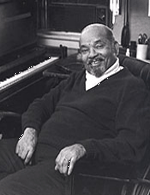Michigan's Musical Connection: Sy Oliver
Before I proceed, I have to tell everyone how much fun this episode has been to compose. Part of what I hope to convey in this feature is that Michigan has been, and continues to be, the birthplace and/or adoptive home of many creative people that enrich our lives through the expression of their art. This process of presenting these artists here is also a path of personal education for me.
I have been involved in the music business for about thirty years; as a musician and also while employed for various entertainment companies. I have always had a deep and passionate interest in music, it's history, the mechanics and the behind-the-scenes occurrences associated.
This week, the featured artist is Sy Oliver. Born in Battle Creek on December 17, 1910 and later moved to Ohio where his parents were teachers. Sy Oliver had a dynamic career and was very influential in the genre of Big Band and Jazz musical styles. He was a performer, composer, arranger and band leader.
African American Registry -

I am also including a snippet from an interview with Sy Oliver from 1974 where Sy recounts many of the highlights and hurdles he encountered.
Jazz Professional -
I will conclude this post with one more quoted link from Answers.com:
I have been involved in the music business for about thirty years; as a musician and also while employed for various entertainment companies. I have always had a deep and passionate interest in music, it's history, the mechanics and the behind-the-scenes occurrences associated.
This week, the featured artist is Sy Oliver. Born in Battle Creek on December 17, 1910 and later moved to Ohio where his parents were teachers. Sy Oliver had a dynamic career and was very influential in the genre of Big Band and Jazz musical styles. He was a performer, composer, arranger and band leader.
African American Registry -

Melvin James "Sy" Oliver was from Battle Creek, Michigan. Both of his parents were music teachers in Ohio, where he grew up. He played the trumpet as a boy and at the age of 17 took a job with Zack Whyte and his Chocolate Beau Brummels. He joined the Jimmie Lunceford orchestra in 1933. There he established a reputation for innovative arranging characterized by imaginative instrumentation and a full-bodied sound. He also developed a distinctive "growl" sound, in his own playing.
In 1939 he joined the orchestra of Tommy Dorsey as a singer and arranger. He led a band while in the army during World War II and returned to Dorsey's orchestra after the war. From the late 1940s to the early '70s Oliver held a variety of jobs, including a decade as musical director of Decca Records. (more...)
I am also including a snippet from an interview with Sy Oliver from 1974 where Sy recounts many of the highlights and hurdles he encountered.
Jazz Professional -
People think of musicians as being effete, weaklings, delicate and so on. You take the average man and let him live six months as .the average musician does, he'd literally fall to pieces. During a war you say it takes a certain number of men behind the lines to keep one man up front with a gun. Well, people should sit down and figure out the man-hours it takes to present one minute on the stage,the hours and hours of writing, rehearsing and the practice that these men went through to develop the expertise that they have. This doesn't spring full-blown.
Musicians would be the first to laugh if you said anything about their being dedicated, only writers and analysts go around talking about that sort of thing. But they are literally dedicated people, through something inside them that makes them that way.
There's so much romantic nonsense written about music, talking about New Orleans jazz, Chicago jazz, Kansas City jazz. Ridiculous, it's all of a piece. To say otherwise is just trying to make a good story. Music is never static; guys come along with new ideas constantly. Sometimes they're old ideas that have been obscured by time, like many rock cliches, things out of ragtime, and so on. But whether the idea being presented is something from the past or something for the future, it's still filled with change. What happens is: the worth-while things from any fad remain part of the language. The good things in the music of yesterday live and combine with the good things in the music of today to make the music of tomorrow. (more from this ...)
I will conclude this post with one more quoted link from Answers.com:
Sy Oliver's melodic yet sophisticated arrangements helped define the Jimmy Lunceford sound in the 1930s and modernized Tommy Dorsey's band in the '40s. A fine trumpeter (excellent with a mute) and a likable vocalist, Oliver made his recording debut with Zack Whyte's Chocolate Beau Brummels in the late '20s and also worked with Alphonse Trent. Joining Lunceford in 1933, Oliver was responsible for such memorable charts as "My Blue Heaven," "Ain't She Sweet," "Organ Grinder's Swing," and "'Tain't What You Do," among many others. It was a major blow to Lunceford when Oliver jumped at the chance to make a lot more money arranging and occasionally singing for Tommy Dorsey. The hiring of Sy Oliver was a major help for T.D. in getting Buddy Rich to join his band. Oliver's arrangement of "On the Sunny Side of the Street" was his biggest hit for Dorsey. After a brief attempt at leading his own orchestra in 1946, Oliver became a freelance arranger and producer for the remainder of his long career. As late as 1975-1980, he was regularly leading a band but Sy Oliver will always be best known for his classic Lunceford charts. ~ Scott Yanow, All Music Guide (more ...)
Labels: Michigan's Musical Connection







0 Comments:
Post a Comment
Subscribe to Post Comments [Atom]
<< Home